9-10 September 2021, Mother See Of Holy Etchmiadzin, Armenia Communiqué
The conference on International Religious Freedom and Peace, convened at the Mother See of Holy Etchmiadzin in Armenia on 9-10 September 2021, brought a special focus to the promotion of freedom of religion and preservation of spiritual, cultural and historical heritage.
Meeting in Holy Etchmiadzin, under the patronage of His Holiness Karekin II, Supreme Patriarch and Catholicos of All Armenians, and with the presence and testimonies of representatives of the Government of Artsakh/Nagorno-Karabakh Republic, we conference participants from the worldwide Christian community were deeply moved and inspired by the history of the Armenian people, the first nation to adopt the Christian faith as State religion, their survival despite the crime of genocide perpetrated by the Ottoman Empire in early XX century, the horrors of the 2020 war in Nagorno-Karabakh and other ills in the course of history. The Armenian people’s continued resilience and faithfulness to their faith and culture deserved further appreciation by the Christian world.
We re-affirm the principles of the right to freedom of religion or belief, as articulated in the Universal Declaration of Human Rights and subsequent international and regional human rights treaties. We claim this right, equally, for all people, of any faith or none, and regardless of nation, history or political circumstances – including for those Armenian prisoners of war still illegally held in captivity by Azerbaijan, for whose swift release and repatriation we appeal and pray, and for the people of Artsakh/Nagorno Karabakh whose rights to free and peaceful assembly and association necessarily implicate the sacred character of human life.
We stress the critical importance of the protection of holy sites, places of worship and religious heritage for the effective realization of religious freedom, and for the promotion and preservation of peaceful relations among nations and communities. Protecting places of worship and safeguarding free access to them is essential for guaranteeing the exercise of religious freedom.
Moreover, holy sites, places of worship and items of religious heritage are representative of the deepest identities of people and communities of faith. Precisely for this reason, in situations of conflict they are often deliberately targeted in order to inflict maximum collective trauma on a particular community. Any attack on any religious community, whether on individuals who are members of that community or on places related to that community, is an attack on religious freedom in general, and therefore an attack on all religious communities. And because religious buildings and sites are bearers of religious identity, damaging a place of worship is an act of real violence against the personal and collective religious identity of believers, wounding their identities and memories.
On the other hand, by caring for the physical integrity of holy sites and places of worship, we uphold the human dignity of those who hold them dear, and, when we cooperate among nations, governments and communities of faith to protect religious heritage, a transformative message of healing and togetherness is conveyed.
We therefore join in endorsing the Universal Code of Conduct on Holy Sites, and in particular the following provisions and stipulations:
• Holy sites shall be preserved for present and future generations, with dignity, integrity and respect for their name and confessional identity. They shall be preserved both as sites of religious significance, and as historical, cultural and ecological legacies of their communities and of humankind. They shall not be desecrated or damaged, nor shall religious communities be forcibly deprived of their holy sites; and
• …all parties shall promote the preservation of holy sites, acknowledge the significance of holy sites of others as places of worship and sites of identity, respect the sensitivities of others with regard to these sites, and stress their spiritual value rather than any strategic, territorial or military significance. The attachment of a group to its holy site shall not be denied.
We also acknowledge and affirm relevant provisions of the UN Plan of Action to Safeguard Religious Sites; the UN Plan of Action for religious leaders and actors to prevent incitement to violence that could lead to atrocity crimes; the World Heritage Convention; and the Statement on the protection of religious properties within the framework of the World Heritage Convention.
With regard to the situation in Artsakh/Nagorno-Karabakh following the conflict in 2020, perpetrated by Azerbaijan and supported by its allies, we are deeply alarmed by the many reports of destruction, damage and desecration of Armenian religious and cultural heritage in areas now under Azerbaijani control. Our concern is greatly amplified by the well-substantiated reports of the systematic erasure of Armenian historical sites of world heritage significance in Djulfa, Nakhichevan, and elsewhere in Azerbaijan.
We therefore:
– Call on the Government of Azerbaijan to allow immediate and unimpeded international access to the areas of Artsakh/Nagorno-Karabakh which have recently come under Azerbaijan’s control, as well as to relevant sites in Nakhichevan and elsewhere in Azerbaijan, for the purpose of independent assessment and monitoring missions.
– Urge UNESCO to make an assessment mission to these areas an urgent priority.
– Encourage proactive and regular engagement in dialogue and cooperation, and vocal and active solidarity when religious sites and worshippers from other religions and faiths are targeted.
– Appeal for solidarity and action from all members of the international community to assure Armenian people and communities of the same rights to which all are entitled as a matter of international law and moral responsibility, including the rights to life, to freedom of religion or belief, to cultural expression, and to self-determination.
– Express our deep Christian solidarity, and the solidarity of the global ecumenical fellowship with the Armenian Church and people in their lives, ministries and witness to the world.
– Pledge to continue to work together in the development and implementation of a more detailed action plan to address the issues and concerns raised during these days together in Holy Etchmiadzin.

